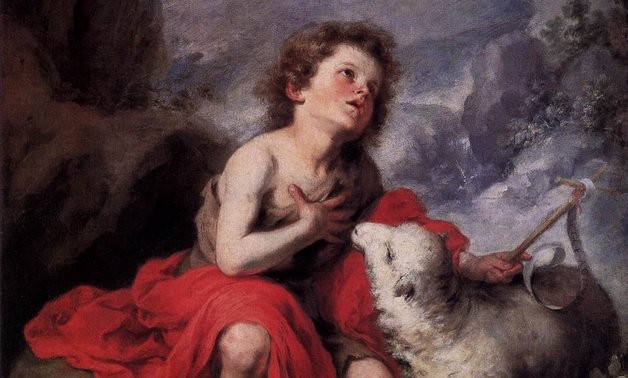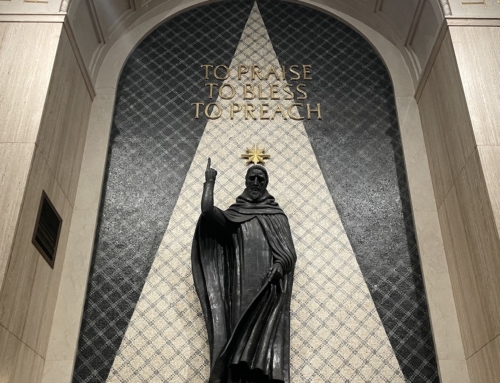The figure of John the Baptist personifies this season of Advent – assiduously preparing for the coming of the promised Messiah; fasting; enduring physical discomfort; crying out day and night; conveying the need to look within ourselves and root out anything not fit for the kingdom of heaven that is so near. With his tough, observant character, John the Baptist has been identified as a kind of Nazarite, a type of ascetic found among the Hebrew people in biblical times.
In many ways, the patients in a hospital share a lot in common with this great saint. Like John the Baptist, they too cry out day and night, enduring discomforts and even fasting so that they and their doctors and surgeons can look intently within them and root out physical corruption. The difference is that their cries and concern are focused inwardly on their bodies rather than outwardly on the awaited Savior.
These patients’ behavior is human and natural, even necessary for healing. Unless a patient clearly and promptly communicates his pains and other symptoms to the doctor and nurses, he cannot expect healing. Similarly in the spiritual life, an intense inward focus and self-examination prepare the way back to health. It demands honesty and a readiness to change, commitment to a course of hard work in filling in all the deficiencies and pulling down the peaks of painful excess – building a highway to health. It is the Baptist’s invitation to renewal through examination of conscience and repentance. It is where we must begin our Advent journey.
In the hospital, however, there is always the danger that so much attention to one’s own broken self can fix our vision on the suffering that is before us and turn our eyes away from the happiness for which we are preparing. Every patient in the hospital undergoes suffering and faces this temptation. One type of patient, however, usually triumphs easily and with joy – the new mother in the maternity ward. The mother stands out among patients as the only one naturally looking beyond herself – she is focused on the tiny, fragile human life in the bassinet next to her bed. She has suffered, make no mistake, and is doubtless still in pain from the labor she just endured, as if all the sufferings of the past nine months were distilled into the long hours of birthing the child. But the child is a sign of Jesus’ promise that whoever offers up his or her own good, giving his or her life for God (who is love), “will receive [everything back] a hundredfold now in this time, with persecutions, and have eternal life in the age to come” (Mark 10:29-30). From a self-oriented perspective, the newborn promises his mother much persecution over the next few decades – sleepless nights, heaps of dirty laundry, and all sorts of bills related to a child who can’t even talk to her (and a hundredfold in the teenager that is to come, perhaps)! Yet from the mother’s selfless perspective, the baby is a promise of great reward. He blesses his mother with love, the free and total gift of his whole self. The infant points the mother to her life’s goal, her happiness.
Happiness is something that lies outside of ourselves – something related to us yet beyond us at the same time. This relationship is an opportunity to live selfless love. Love reverses the direction of our concern – transferring it from our own good to the good of the other who is nonetheless akin to us. Patients must be able to make this transfer if they want happiness once they return to health.
That is why in Advent the figure of John the Baptist gives way to that of the infant Jesus of Christmas. The baby surpasses the Baptist. This is one way to make sense of Jesus’ puzzling words “there is none greater than John the Baptist, yet the least in the kingdom of heaven is greater than he” (Mat. 11:11). The infant alone can confer citizenship in the kingdom of heaven: The child enables its mother to pass out of herself and into a new life, which is bound up with another’s. For each of us, our greatest good is found in God, whose children we are. Created in His image and likeness, we are indeed related to this Ultimate Good – indeed, doubly so, since the Son deigned to take flesh and unite Himself to our very humanity so that we could become the adopted, grace-filled sons and daughters of God. Let us then follow John the Baptist’s cry all the way to the cry of the infant Jesus. He calls us to make this journey from the Nazarite to the infant Nazarene: “Amen I say to you, unless you be converted and become as little children, you shall not enter the kingdom of heaven” (Mat. 18:3).
✠
Image: Bartolomé Esteban Murillo, St. John the Baptist as a Boy







